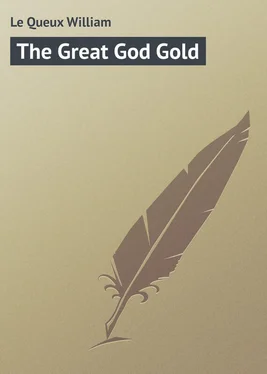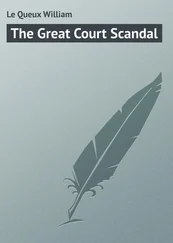William Le Queux - The Great God Gold
Здесь есть возможность читать онлайн «William Le Queux - The Great God Gold» — ознакомительный отрывок электронной книги совершенно бесплатно, а после прочтения отрывка купить полную версию. В некоторых случаях можно слушать аудио, скачать через торрент в формате fb2 и присутствует краткое содержание. Жанр: foreign_prose, на английском языке. Описание произведения, (предисловие) а так же отзывы посетителей доступны на портале библиотеки ЛибКат.
- Название:The Great God Gold
- Автор:
- Жанр:
- Год:неизвестен
- ISBN:нет данных
- Рейтинг книги:5 / 5. Голосов: 1
-
Избранное:Добавить в избранное
- Отзывы:
-
Ваша оценка:
- 100
- 1
- 2
- 3
- 4
- 5
The Great God Gold: краткое содержание, описание и аннотация
Предлагаем к чтению аннотацию, описание, краткое содержание или предисловие (зависит от того, что написал сам автор книги «The Great God Gold»). Если вы не нашли необходимую информацию о книге — напишите в комментариях, мы постараемся отыскать её.
The Great God Gold — читать онлайн ознакомительный отрывок
Ниже представлен текст книги, разбитый по страницам. Система сохранения места последней прочитанной страницы, позволяет с удобством читать онлайн бесплатно книгу «The Great God Gold», без необходимости каждый раз заново искать на чём Вы остановились. Поставьте закладку, и сможете в любой момент перейти на страницу, на которой закончили чтение.
Интервал:
Закладка:
“But was the temple already plundered?” asked Gwen, seated with her chin resting upon her hand, listening intently.
“We know that it was plundered seriously by Shishak, King of Egypt, who carried off many of its greatest treasures, including the celebrated golden shields of Solomon’s house, which Rehoboam replaced by brass to keep up the display,” was the Professor’s prompt reply. “Recent discoveries at Karnak tell the whole story of the conquest from the Egyptian point of view. The kingdom of Judah, it seems, became for a long time tributary to Shishak, and upon the walls of the great temple at Karnak there are the sculptured representation of the siege and the hieroglyphics ‘Fuda Melchi’ – meaning ‘The Kingdom of Judah.’ That was, you will bear in mind, the first spoliation.”
“Were there others?” asked Frank. “I mean others that are authenticated by recent discoveries?”
“Yes, Jehoram reigned in Jerusalem from B.C. 895-892, and after his marriage with Athaliah, daughter of Ahab, the temple was again despoiled, and the daughters of Judah were once more prostituted to the rites of Ashtoreth,” replied Professor Griffin. “Joash, in B.C. 884, repaired the fabric of the temple by public subscription, for he was the inventor of the modern money-box – and there were enough funds left over, we are told, to purchase vessels for the sanctuary. (2 Kings, xii, 4-6; 2 Chronicles, xxiv, 4-14.) This, however, did not last long, for in the reign of Amaziah, ninth King of Judah, Jehoash, King of Israel, defeated him in B.C. 826, took him prisoner and, entering Jerusalem again, reached the temple and conveyed all its treasures to Samaria.
“In the reigns of Jeroboam the Second, Shallam, Menaham and Pekehiah, other vessels and treasures were provided for the temple. Jonathan built the high gate, but his successor, Ahaz, after plunging into all the idolatries of the surrounding nations, making molten images for Baal and sacrificing his children to Moloch in the valley of Hinnom, found himself, according to our best chronologer, Ussher, involved in war. He was therefore compelled to apply for help to Tiglath-pileser, the ‘Tiger-Lord of Asshur,’ King of Assyria, against Syria and Israel, and declaring himself his vassal, sent him all the treasures then left in the temple. Ahaz, we learn from 2 Kings, xvi, 10-18, profaned the temple by dismounting the brazen altar and replacing it by another. Likewise the ‘Great Sea of Solomon,’ too large to be removed at previous despoliations, was dismounted from its supporting oxen, and the lavers from their bases, which were also sent to the King of Assyria, together with the coverings which had been built for the King’s entry to the house, and for the shelter of the worshippers on the Sabbath. The golden vessels of the House of God were cut in pieces and sent with the rest, and the sanctuary itself was shut up. Hezekiah, who came after him in B.C. 726, reopened and restored the Holy Place, though it was now devoid of most of its treasures.
“To trace the history of the Temple through the days of Hoshea, son of Elah, Manasseh and Amon is perhaps unnecessary. Under Josiah, whose reign marks the last dying glory of the earthly kingdom of David, idolatry was put away, the Temple was renovated and the Ark of the Covenant which had been hidden restored to its place. (2 Chronicles, xxxiv, 3-13; xxxv, 3.) During these repairs the high priest Hilkiah found the sacred copy of the book of the law and delivered it to Shaphan, the scribe, who read it before the king. It was afterwards publicly read, and incited a new zeal among the people, and once again was the sanctuary filled with gold and silver vessels. Therefore you will see that by this period there could not have been any of the actual treasures placed by Solomon remaining in the Temple.”
“The Ark of the Covenant was still there,” remarked young Farquhar.
“That is not at all certain,” was the old man’s reply. “Many of the events chronicled in the Old Testament are corroborated by the inscriptions found by Flinders Petrie in Egypt and by Layard at Nineveh. Others are negatived, and our chronology rendered uncertain. Certain it is, however,” he went on, “that in the fourth year of the reign of Jehoiakim, eighteenth King of Judah (B.C. 608-597), Nebuchadnezzar arose, and a few years later advanced to Jerusalem, which he took after a brief siege. The vessels of the sanctuary were carried off to Babylon, where they were dedicated in the temple of Belus. If you turn to 2 Kings, xxiv, 13, you will there read: ‘And he carried out thence all the treasures of the house of the Lord, and the treasures of the king’s house, and cut in pieces all the vessels of gold which Solomon, King of Israel had made in the temple of the Lord, as the Lord had said.’”
“Surely it was Ezekiel who went as one of the prisoners of Nebuchadnezzar to Babylon,” remarked Gwen.
“Yes,” replied her father, “on the second occasion when the Babylonian king attacked the city. But,” he added, “in the reference I have just given you, you will note that the vessels are described as ‘those that Solomon had made.’ Either therefore they had been too massive for removal on the many previous occasions when the temple was plundered or they had been made to replace the ancient originals. The latter is my own theory. Now, as I dare say you will recollect, in B.C. 586, on the tenth day of the fifth month, Ab, Nebuchadnezzar again advanced against the rebellious city of Jerusalem and destroyed it. The two great pillars of the temple porch, Jachin and Boaz, and Solomon’s brazen sea with the twelve bulls supporting it, were broken in pieces and their brass transported to Babylon, together with a great number of captives. And on the third day of the catastrophe, in the nineteenth year of Nebuchadnezzar, the temple and the city were committed to the flames with the palaces of the king and princes, and all the chief houses of Jerusalem, and their walls levelled to the ground.”
Конец ознакомительного фрагмента.
Текст предоставлен ООО «ЛитРес».
Прочитайте эту книгу целиком, купив полную легальную версию на ЛитРес.
Безопасно оплатить книгу можно банковской картой Visa, MasterCard, Maestro, со счета мобильного телефона, с платежного терминала, в салоне МТС или Связной, через PayPal, WebMoney, Яндекс.Деньги, QIWI Кошелек, бонусными картами или другим удобным Вам способом.
Интервал:
Закладка:
Похожие книги на «The Great God Gold»
Представляем Вашему вниманию похожие книги на «The Great God Gold» списком для выбора. Мы отобрали схожую по названию и смыслу литературу в надежде предоставить читателям больше вариантов отыскать новые, интересные, ещё непрочитанные произведения.
Обсуждение, отзывы о книге «The Great God Gold» и просто собственные мнения читателей. Оставьте ваши комментарии, напишите, что Вы думаете о произведении, его смысле или главных героях. Укажите что конкретно понравилось, а что нет, и почему Вы так считаете.












